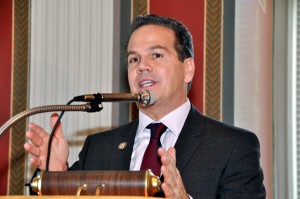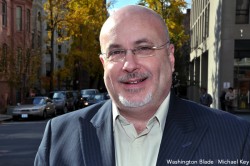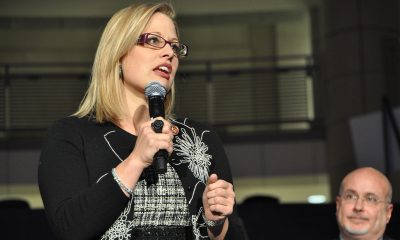National
Gay House, Senate candidates running strong
Numbers show Baldwin, others winning fundraising battles

Gay and lesbian candidates for the U.S. House and Senate are competitive with — and in some cases besting — their straight opponents when it comes to raising money.
Fundraising numbers for the fourth quarter of 2011 and the year in total became public earlier this month after candidates submitted their campaign filings in accordance with federal election law.
Rep. Tammy Baldwin, who’s seeking to become the first openly gay U.S. senator, made a particularly impressive showing in the final quarter in her bid to represent Wisconsin in the Senate by taking in $1.16 million.
The fourth quarter haul means the Democrat and seven-term House member raised $2.5 million last year for her Senate campaign. She has $1.8 million in cash on hand.
Phillip Walzak, a Baldwin spokesperson, said the number demonstrates the strength of her campaign.
“These figures demonstrate the strength of Tammy’s grassroots campaign, and the depth of support for her message to stand up for our shared values, and put the people ahead of right-wing radicals and corporate special interests,” Walzak said.
Nathan Gonzales, editor of the Rothenberg Political Report, said Baldwin won’t “lose the Senate race because she doesn’t have enough money,” although it remains a toss-up and could be “one the top general elections in the country.”
Gonzales added he doesn’t think Baldwin’s sexual orientation will factor into the race heading into the general election.
“I see Republicans talking about her just being from Madison and how being a liberal Democrat from Madison puts her out of touch with the rest of the state rather than making her sexuality an issue,” Gonzales said.
Republican candidates in the race don’t come close to Baldwin in fundraising. Former Wisconsin Gov. Tommy Thompson raised $657,000 and has $544,000 in cash on hand. Former congressman and gubernatorial candidate Mark Neumann raised $826,000 and has $552,000 in cash on hand.
Denis Dison, spokesperson for the Gay & Lesbian Victory Fund, said Baldwin has “lapped everybody in the field” of Republicans.
“They’re going to be spending that money in the primary,” Dison said. “This is going to be a pretty ugly primary on the Republican side. They’re really going to have to spend all the way to win their nomination.”
Democrat Mark Takano, a gay public school teacher and member of the Riverside Community College District’s Board of Trustees, is also on top in fundraising for the race to represent California’s newly created 41st congressional district — although by a much slimmer margin.
Takano has raised $288,000 in total and has $212,000 in cash on hand. The Republican in the race, Riverside County Supervisor John Tavaglione has raised $275,000 and has $177,000 in cash on hand.
Gonzales said he thinks the race will be “competitive” in the general election, but added that Takano has the advantage.
“I think Republicans looking at numbers think there may be an opportunity there in a mid-term election,” Gonzales said. “In the presidential race where the president is going to do very well in the state, overall, I think, Takano has the edge.”
Rep. David Cicilline, whom many thought would face a tough re-election campaign because of his unpopularity in the polls, is also outraising his Republican opponents and faces no Democratic challenger.
The Rhode Island Democrat has raised a total of $949,000 and has $518,000 in cash on hand. Republican businessman and former law enforcement official Brendan Doherty has raised $617,000 and has $482,000 in cash on hand.
Cicilline nose-dived in the polls last year because he was seen as less than forthcoming about the troubled finances of Providence, R.I., during his tenure as mayor prior to his election to the U.S. House.
The city of 178,000 faced a $110 million projected budget deficit and the rainy-day fund diminished from more than $22.3 million three years ago to less than $221,000, according to a report last year from Politico.
Gonzales said Cicilline’s problem in the general election won’t be money, but his approval rating, and predicted the race will be competitive even though Rhode Island is considered a Democratic state.
“If voters are focused on Cicilline’s record in Congress, then he’ll probably be fine for re-election, if they’re focused on his time as mayor and how they feel about how he described his tenure when he was running for Congress, then his re-election becomes a much dicier proposition,” Gonzales said.
Dison said he thinks Cicilline will do better than expected in the fall because his district was altered during the redistricting process to become even more Democratic.
“It would be very tough for a Republican to win that seat, unless there is a Republican wave out there,” Dison said. “But even in the last election, which was obviously a Republican wave, he won the district pretty handily.”
Other gay candidates aren’t ahead in fundraising, but are still doing well enough to remain competitive in their races.
Democrat Mark Pocan, a gay member of the State Assembly seeking the U.S. House seat Baldwin is vacating at the end of the year, has raised $274,000 and has $204,000 in cash on hand.
But it’s less money than David Worzala, another Democrat and the Dane County Treasurer. The candidate has raised $278,000 and has $252,196 in cash on hand.
Dison said Worzala’s lead in fundraising is misleading because the candidate loaned himself $170,000 and Pocan actually doubled and tripled what the other candidate raised.
“In terms of fundraising, he’s not doing very well raising money from individual donors, whereas Pocan is doing very well both from political action committees and individuals,” Dison said.
Dison added that Pocan’s endorsements are “overwhelming” and said every major Democrat and union has backed the gay candidate in the race.
Both candidates in this race are ahead of Kelda Roys, another Democratic member of the State Assembly, who’s raised $147,000 and has $128,828 in cash on hand.
In Massachusetts, gay Republican Richard Tisei, a former member of the Massachusetts Legislature and former candidate for lieutenant governor, is behind in his bid to unseat Rep. John Tierney (D-Mass.), but still has sizable funds.
Tisei has raised $311,559 and has $260,000 in cash on hand, but the incumbent Tierney, running in the strongly Democratic state, raised $577,545 and has $546,000 in cash on hand.
But looking just at the fourth quarter, Tisei bested Tierney in terms of fundraising. The Republican raised $311,558, almost all the fundraising for his campaign, in that quarter, while Tierney raised $161,105. Another Republican in the race, attorney and businessman Bill Hudak, dropped out of the race after the fundraising totals were announced.
Gonzales said the Democrat is favored and that it will be tough for any Republican, but said there may be a chance to do better than expected in the race.
“It’s still a Democratic district, but because of questions, ethical questions surrounding Tierney, or more specifically, his family, I think there’s an opportunity,” Gonzales said.
Dison said the seat became more winnable for a Republican with redistricting and the major question in the race is the extent to which the Republican Party rallies behind Tisei in the general election.
“The question will be whether the Republican committees here in town see that as a possible pick up, and if they do, then they’re going to get behind him and spend a lot of money there,” Dison said.
According to Politico, Tierney’s brother-in-law, Daniel Eremian, was convicted of federal racketeering charges related to his operation of an illegal offshore casino. Additionally, Patrice Tierney, the lawmaker’s wife and Eremian’s sister, last year was sentenced to one month in prison and five months of house arrest after pleading guilty to charges that she aided in the filing of her brother’s false tax returns.
Gay Rep. Jared Polis (D-Colo.) has raised $353,ooo and has $166,000 in cash on hand. He’s not expected to face serious competition in his heavily Democratic district.
Federal Government
Lambda Legal praises Biden-Harris administration’s finalized Title IX regulations
New rules to take effect Aug. 1

The Biden-Harris administration’s revised Title IX policy “protects LGBTQ+ students from discrimination and other abuse,” Lambda Legal said in a statement praising the U.S. Department of Education’s issuance of the final rule on Friday.
Slated to take effect on Aug. 1, the new regulations constitute an expansion of the 1972 Title IX civil rights law, which prohibits sex-based discrimination in education programs that receive federal funding.
Pursuant to the U.S. Supreme Court’s ruling in the landmark 2020 Bostock v. Clayton County case, the department’s revised policy clarifies that discrimination on the basis of sexual orientation and gender identity constitutes sex-based discrimination as defined under the law.
“These regulations make it crystal clear that everyone can access schools that are safe, welcoming and that respect their rights,” Education Secretary Miguel Cardona said during a call with reporters on Thursday.
While the new rule does not provide guidance on whether schools must allow transgender students to play on sports teams corresponding with their gender identity to comply with Title IX, the question is addressed in a separate rule proposed by the agency in April.
The administration’s new policy also reverses some Trump-era Title IX rules governing how schools must respond to reports of sexual harassment and sexual assault, which were widely seen as imbalanced in favor of the accused.
Jennifer Klein, the director of the White House Gender Policy Council, said during Thursday’s call that the department sought to strike a balance with respect to these issues, “reaffirming our longstanding commitment to fundamental fairness.”
“We applaud the Biden administration’s action to rescind the legally unsound, cruel, and dangerous sexual harassment and assault rule of the previous administration,” Lambda Legal Nonbinary and Transgender Rights Project Director Sasha Buchert said in the group’s statement on Friday.
“Today’s rule instead appropriately underscores that Title IX’s civil rights protections clearly cover LGBTQ+ students, as well as survivors and pregnant and parenting students across race and gender identity,” she said. “Schools must be places where students can learn and thrive free of harassment, discrimination, and other abuse.”
Michigan
Mich. Democrats spar over LGBTQ-inclusive hate crimes law
Lawmakers disagree on just what kind of statute to pass

Michigan could soon become the latest state to pass an LGBTQ-inclusive hate crime law, but the state’s Democratic lawmakers disagree on just what kind of law they should pass.
Currently, Michigan’s Ethnic Intimidation Act only offers limited protections to victims of crime motivated by their “race, color, religion, gender, or national origin.” Bills proposed by Democratic lawmakers expand the list to include “actual or perceived race, color, religion, gender, sexual orientation, gender identity or expression, ethnicity, physical or mental disability, age, national origin, or association or affiliation with any such individuals.”
Democratic Gov. Gretchen Whitmer and Attorney General Dana Nessel have both advocated for a hate crime law, but house and senate Democrats have each passed different hate crimes packages, and Nessel has blasted both as being too weak.
Under the house proposal that passed last year (House Bill 4474), a first offense would be punishable with a $2,000 fine, up to two years in prison, or both. Penalties double for a second offense, and if a gun or other dangerous weapons is involved, the maximum penalty is six years in prison and a fine of $7,500.
But that proposal stalled when it reached the senate, after far-right news outlets and Fox News reported misinformation that the bill only protected LGBTQ people and would make misgendering a trans person a crime. State Rep. Noah Arbit, the bill’s sponsor, was also made the subject of a recall effort, which ultimately failed.
Arbit submitted a new version of the bill (House Bill 5288) that added sections clarifying that misgendering a person, “intentionally or unintentionally” is not a hate crime, although the latest version (House Bill 5400) of the bill omits this language.
That bill has since stalled in a house committee, in part because the Democrats lost their house majority last November, when two Democratic representatives resigned after being elected mayors. The Democrats regained their house majority last night by winning two special elections.
Meanwhile, the senate passed a different package of hate crime bills sponsored by state Sen. Sylvia Santana (Senate Bill 600) in March that includes much lighter sentences, as well as a clause ensuring that misgendering a person is not a hate crime.
Under the senate bill, if the first offense is only a threat, it would be a misdemeanor punishable by one year in prison and up to $1,000 fine. A subsequent offense or first violent hate crime, including stalking, would be a felony that attracts double the punishment.
Multiple calls and emails from the Washington Blade to both Arbit and Santana requesting comment on the bills for this story went unanswered.
The attorney general’s office sent a statement to the Blade supporting stronger hate crime legislation.
“As a career prosecutor, [Nessel] has seen firsthand how the state’s weak Ethnic Intimidation Act (not updated since the late 1980’s) does not allow for meaningful law enforcement and court intervention before threats become violent and deadly, nor does it consider significant bases for bias. It is our hope that the legislature will pass robust, much-needed updates to this statute,” the statement says.
But Nessel, who has herself been the victim of racially motivated threats, has also blasted all of the bills presented by Democrats as not going far enough.
“Two years is nothing … Why not just give them a parking ticket?” Nessel told Bridge Michigan.
Nessel blames a bizarre alliance far-right and far-left forces that have doomed tougher laws.
“You have this confluence of forces on the far right … this insistence that the First Amendment protects this language, or that the Second Amendment protects the ability to possess firearms under almost any and all circumstances,” Nessel said. “But then you also have the far left that argues basically no one should go to jail or prison for any offense ever.”
The legislature did manage to pass an “institutional desecration” law last year that penalizes hate-motivated vandalism to churches, schools, museums, and community centers, and is LGBTQ-inclusive.
According to data from the U.S. Department of Justice, reported hate crime incidents have been skyrocketing, with attacks motivated by sexual orientation surging by 70 percent from 2020 to 2022, the last year for which data is available.
Twenty-two states, D.C., Puerto Rico, and the U.S. Virgin Islands have passed LGBTQ-inclusive hate crime laws. Another 11 states have hate crime laws that include protections for “sexual orientation” but not “gender identity.”
Michigan Democrats have advanced several key LGBTQ rights priorities since they took unified control of the legislature in 2023. A long-stalled comprehensive anti-discrimination law was passed last year, as did a conversion therapy ban. Last month the legislature updated family law to make surrogacy easier for all couples, including same-sex couples.
A bill to ban the “gay panic” defense has passed the state house and was due for a Senate committee hearing on Wednesday.
Indiana
Drag queen announces run for mayor of Ind. city
Branden Blaettne seeking Fort Wayne’s top office

In a Facebook post Tuesday, a local drag personality announced he was running for the office of mayor once held by the late Fort Wayne Mayor Tom Henry, who died last month just a few months into his fifth term.
Henry was recently diagnosed with late-stage stomach cancer and experienced an emergency that landed him in hospice care. He died shortly after.
WPTA, a local television station, reported that Fort Wayne resident Branden Blaettne, whose drag name is Della Licious, confirmed he filed paperwork to be one of the candidates seeking to finish out the fifth term of the late mayor.
Blaettner, who is a community organizer, told WPTA he doesn’t want to “get Fort Wayne back on track,” but rather keep the momentum started by Henry going while giving a platform to the disenfranchised groups in the community. Blaettner said he doesn’t think his local fame as a drag queen will hold him back.
“It’s easy to have a platform when you wear platform heels,” Blaettner told WPTA. “The status quo has left a lot of people out in the cold — both figuratively and literally,” Blaettner added.

The Indiana Capital Chronicle reported that state Rep. Phil GiaQuinta, who has led the Indiana House Democratic caucus since 2018, has added his name to a growing list of Fort Wayne politicos who want to be the city’s next mayor. A caucus of precinct committee persons will choose the new mayor.
According to the Fort Wayne Journal Gazette, the deadline for residents to file candidacy was 10:30 a.m. on Wednesday. A town hall with the candidates is scheduled for 6 p.m. on Thursday at Franklin School Park. The caucus is set for 10:30 a.m. on April 20 at the Lincoln Financial Event Center at Parkview Field.
At least six candidates so far have announced they will run in the caucus. They include Branden Blaettne, GiaQuinta, City Councilwoman Michelle Chambers, City Councilwoman Sharon Tucker, former city- and county-council candidate Palermo Galindo, and 2023 Democratic primary mayoral candidate Jorge Fernandez.
-

 District of Columbia2 days ago
District of Columbia2 days agoReenactment of first gay rights picket at White House draws interest of tourists
-

 District of Columbia2 days ago
District of Columbia2 days agoNew D.C. LGBTQ+ bar Crush set to open April 19
-

 Arizona2 days ago
Arizona2 days agoAriz. governor vetoes anti-transgender, Ten Commandments bill
-

 Africa4 days ago
Africa4 days agoUgandan activists appeal ruling that upheld Anti-Homosexuality Act















